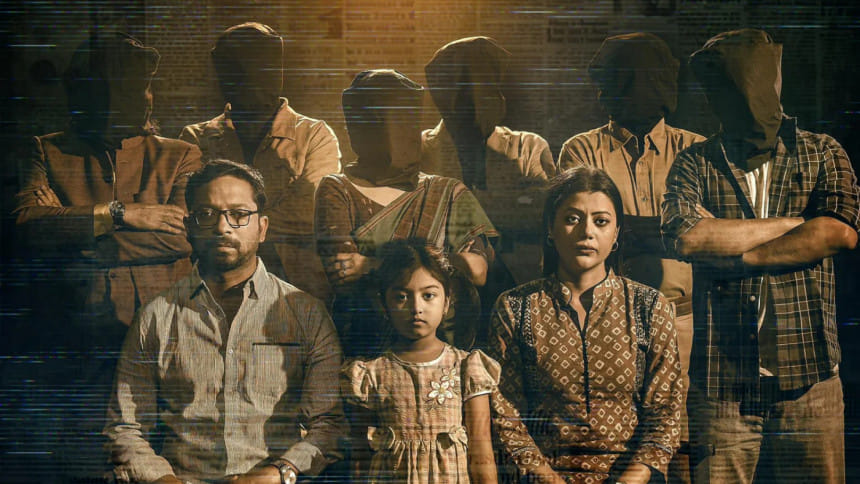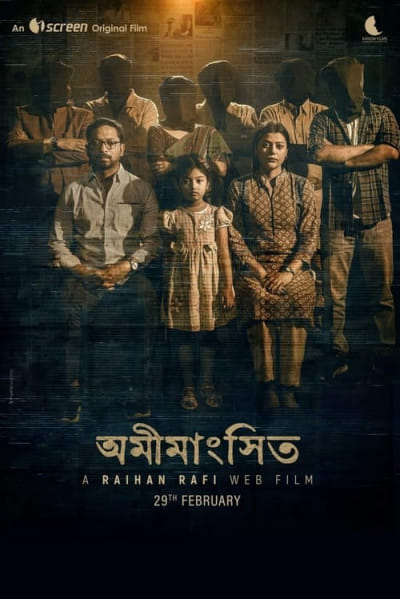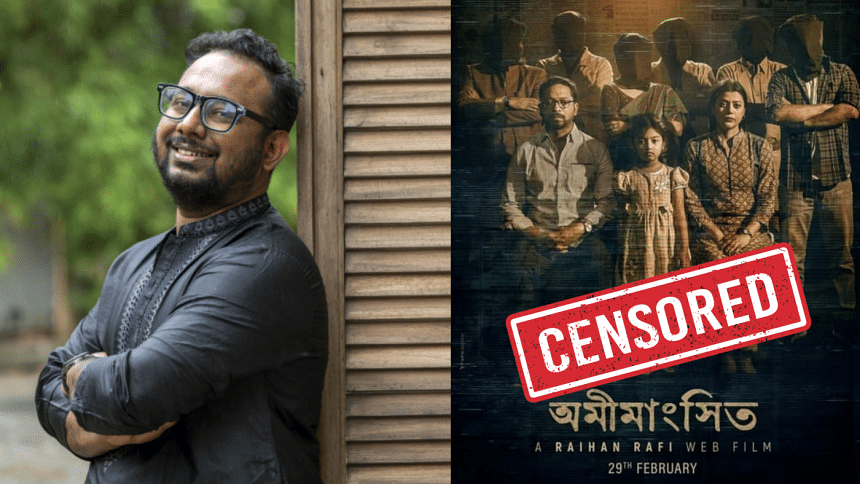Raihan Rafi opposes censor board’s move to halt ‘Omimangshito’ release
The release of the highly anticipated film “Omimangshito”, directed by Raihan Rafi, has been halted by the Bangladesh Film Censorship Board (BFCB). The decision was prompted by allegations that the film depicted real-life gruesome homicide incidents involving two renowned Bangladeshi journalists.

The board concluded that scenes depicting brutal killings were present in the film. They argued that the film blurs the lines between reality and its narrative, acting, and dialogues, rendering it unsuitable for public viewing.
Upon receiving the concerning letter today noon, the director of the web-film, Raihan Rafi, pressed home his protest and concern over the undue censorship of the film’s content, stating it is against the creative freedom of filmmakers.
In a Facebook post from his official account, Raihan Rafi vehemently expressed his surprise and opposition in the matter stating, “The release of our film ‘Omimangshito’ has been halted by the censor board due to its connection with reality! Films should depict fiction, not reality!!!!”
“We strongly protest against the obstruction of the web-film ‘Omimangshito’ by the censor board. So can’t we filmmakers supposedly not portray any journalist couple being murdered in our films? Even after mentioning that that film is purely fictional – if any connection is found with a real-life event, then why should the film be deemed inappropriate to be screened? Shouldn’t be the director in charge of his film? And I’m not into conspiracy theories, I just depicted some of the ideas that people had about the gruesome incident,” the director continued.
“And if a girl goes missing and is found murdered in a film, will that be linked to the Tonu murder case in Cumilla? If a boy’s body is found in a river in a film, will it be linked to the Narayanganj murder case?” Rafi inquired.
“Nothing real has been portrayed in the film ‘Omimangshito’, just different people’s perceptions have been presented, yet, regrettably, this film has been halted!” the filmmaker addressed.

“Basically, in conclusion, it seems like depictions of murders, rapes, or kidnappings are prohibited in our films. It’s as if we are all angels residing in an idyllic paradise, where such crimes simply do not occur. This is how our country’s cinema will have to be censored, with our hands tied, under the guise of protection,” the director concluded with stern revulsion.
The teaser release of the film “Omimangshito” in February sparked speculation that it drew inspiration from real events, potentially the still unsolved Sagar and Runi double murder case. Despite no direct reference, the BFCB flagged its violent content. Concerns over potential misinformation hindering investigations have been raised as well.
An anonymous member of the censor board revealed the film’s narrative connection to the Sagar and Runi case, prompting objections from the Ministry of Home Affairs. After reviews on March 3 and April 22, the board unanimously deemed the film unfit for public viewing under the 1985 Code for Film Censorship, leading to the revocation of its censor certificate application.

Md Mainuddin, deputy director of the board, clarified that those involved could appeal within a 30-day window. Despite prior plans for a February 29 release, objections from BFCB forced a postponement, including a proposed Eid release.
Expressing confusion over the objections, Riaz Ahmed, project director of the iScreen platform, announced plans to appeal. Filmmaker Raihan Rafi also questioned the rationale behind the objections, asserting the creative freedom to depict any story in the film.
After the release of the teaser on February 13, there was some speculation on social media, with some hinting at the infamous murder case of journalist couple Sagar and Runi. Despite the passage of time, the mystery surrounding their case remains unsolved. The incident is still under trial.

In the 40-second teaser, some significant information related to the murder case is presented in dialogue form, such as “The murders occurred between one and two in the morning. I think it’s a robbery case…”, “Journalists, locals, and relatives have destroyed the crime scene. What was my fault?”, “No one killed them. They killed themselves,” and so on.
The film’s poster features Imtiaz Barshan and Tanjika Amin as the main characters, with several people standing behind them wearing black masks. However, their identities and roles are supposed to be revealed in the film.
LondonGBDESK//



Comments are closed.